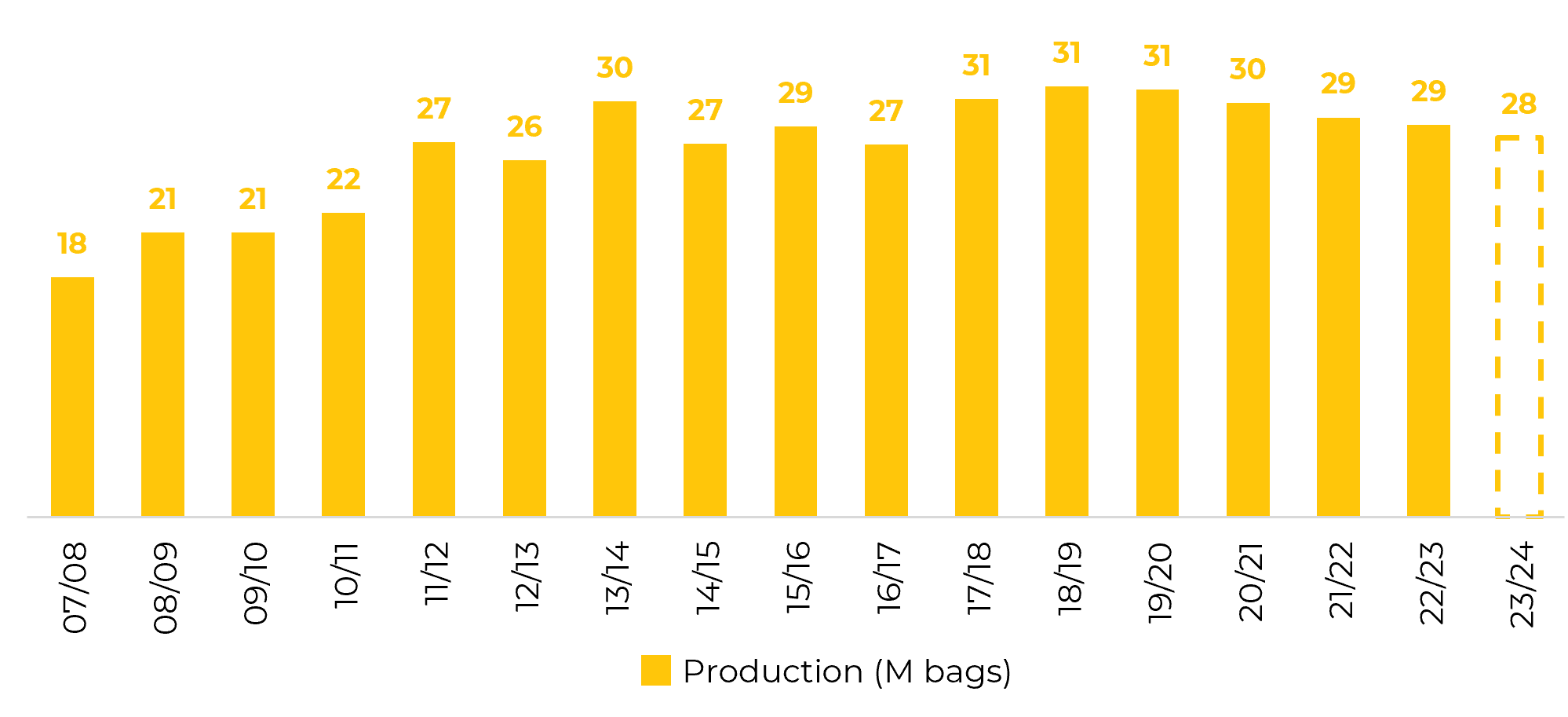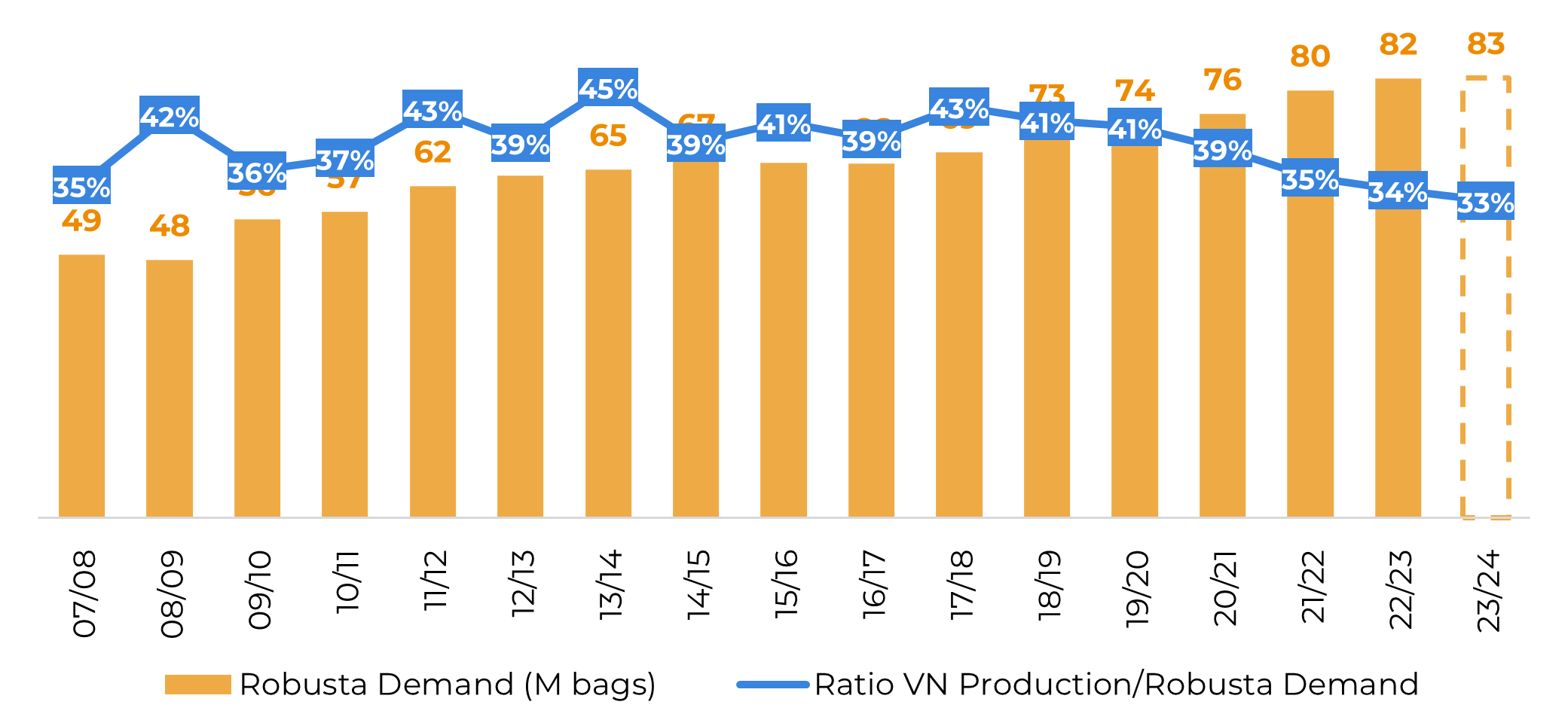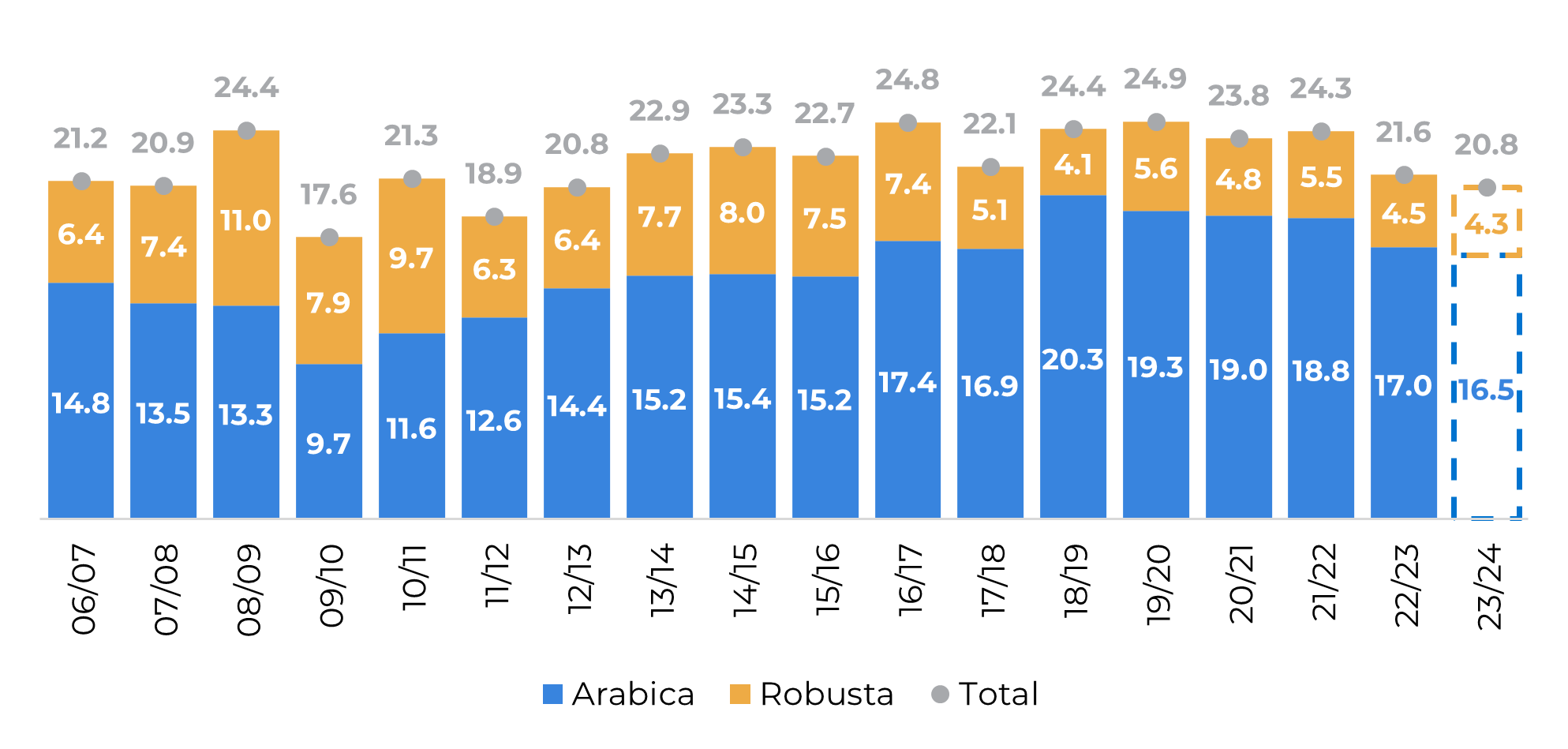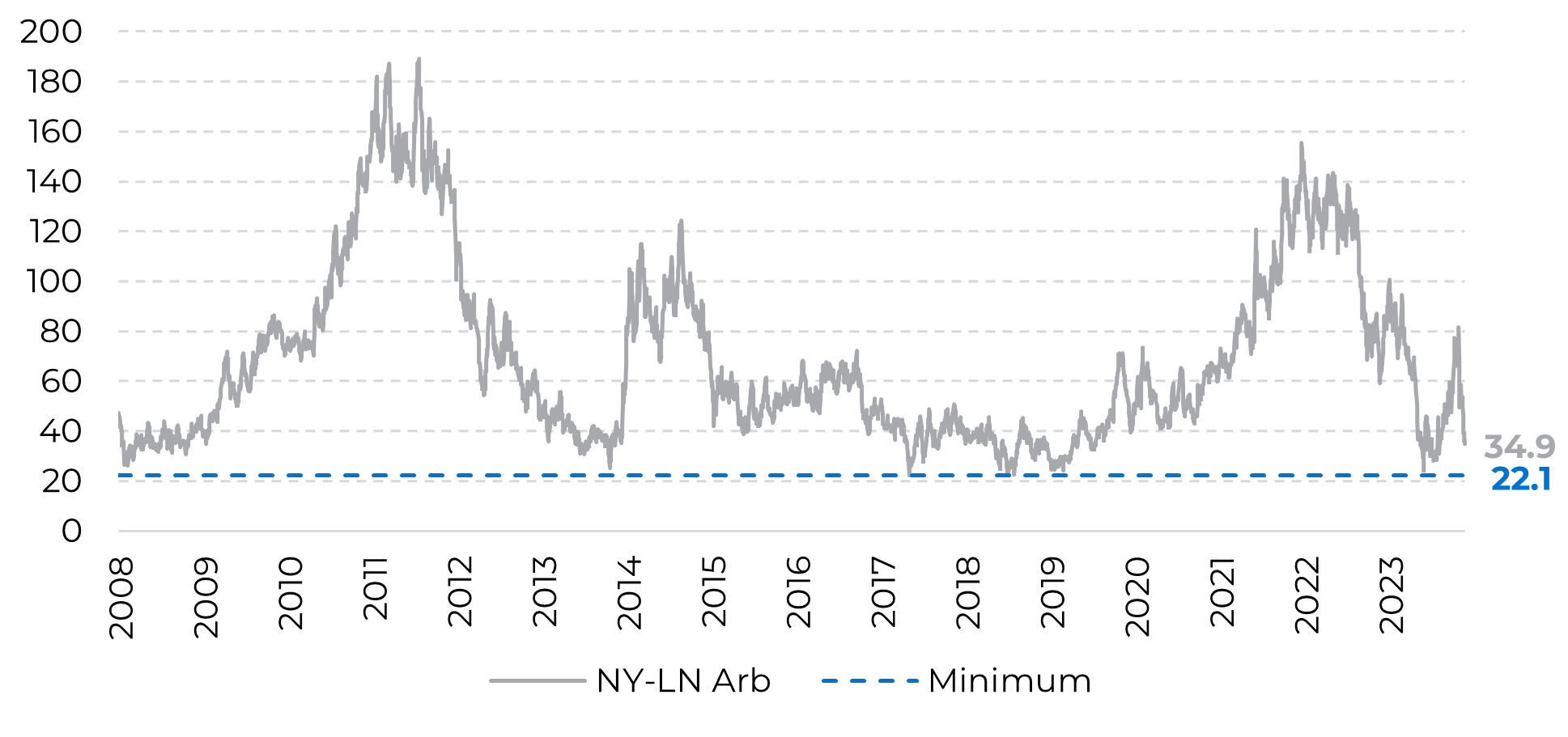
Jan 26
/
Natália Gandolphi
Coffee Weekly Report - 2024 01 26
Back to main blog page
- The NY-LN arbitrage explains and characterizes the current dynamic taking place in the coffee market. Robusta faces a shortage from Vietnam’s output, and possible shipment delays as well. Revisiting the 2007/08 cycle reveals Vietnam's significant crop failure, resulting in a decline in its global output contribution despite rising demand.
- The 2013/14-2015/16 cycles witnessed both arabica and robusta production being impacted by El Niño, leading to a global production deficit. Despite expectations of a shorter-lived El Niño currently, concerns arise about its potential succession by La Niña.
- Historically, the aftermath of arabica recovery and robusta deficits led to low arbitrage levels, raising concerns about future robusta stock recovery. The stability of arabica compared to potential challenges in robusta stocks may influence arbitrage, with current anticipation of downward stock trends. The structural change observed in 2017/18 is not expected to repeat itself.
NY-LN Arbitrage Fundamentals
At present, the coffee market is primarily characterized by the arbitrage between arabica and robusta. Robusta, favored by the market for its cost-effectiveness, has consistently faced lower production in its main origin, Vietnam, in recent years. The current Red Sea conflicts may potentially cause delays in up to a third of global coffee shipments.
On the flip side, arabica is slowly recovering from consecutive crop failures between 2019/20 and 2022/23, with the looming possibility of encountering another La Niña. To understand the current dynamics, we revisit the 2007/08 cycle, marked by Vietnam's significant crop failure (-23% YoY) when the country was a major global coffee player, contributing over 15% to the global output.
Despite production reduction in Vietnam due to decreased area and erratic weather patterns in recent cycles, demand has continued to rise. Consequently, the country is presently supplying the lowest share of robusta to meet market demand in over 16 years.
Figure 1: Total Coffee Production – Vietnam (M bags)

Source: hEDGEpoint
Figure 2: Global Robusta Demand (M bags)
Ratio – Robusta Production – Vietnam/Robusta Demand (%)

Source: hEDGEpoint
.
Between the 2013/14 and 2015/16 cycles, both arabica and robusta production faced challenges due to the impacts of El Niño. Following five years of a global production surplus, the balance plunged to -5.62 million bags.
Although the potential influence of El Niño persists for the development of the 2024/25 crop in Brazil, Indonesia, and Peru, there is an expectation that this El Niño episode will be relatively shorter-lived compared to the one a decade ago, lasting roughly 11 months as opposed to 15. However, it seems destined to be succeeded by its counterpart.
The critical question arises: the last time arabica was recovering from El Niño, and robusta suffered three consecutive deficits, arbitrage reached historically low levels. Yet, the significance lay more in the aftermath, particularly in terms of stocks. While global robusta stocks in destinations are still below pre-2017/18 levels, arabica has managed to recover in the interim.
The concern now is whether robusta stocks might struggle to recover in the future, creating a scenario where arabica remains more stable and consequently driving arbitrage to lower levels. Currently, stocks are anticipated to continue their downward trend, but the structural change observed between 2016/17 and 2017/18 is not expected to repeat itself.
Figure 3: Destination Stocks – Arabica, Robusta, and Total (M bags)

Source: hEDGEpoint
Figure 4: NY-LN Arbitrage (c/lb)

Source: ICE, Refinitiv
In Summary
The current coffee market is marked by the clash between arabica and robusta. Robusta, valued for cost-effectiveness, faces potential shipment delays due to Red Sea conflicts, while arabica is slowly recovering from recent crop failures. Revisiting the 2007/08 cycle, Vietnam's major coffee player status declined, but demand rose despite production reduction. In the 2013/14-2015/16 cycles, El Niño impacted both arabica and robusta, resulting in a global production deficit. Although a shorter-lived El Niño is expected in 2024/25, it may be succeeded by its counterpart.
The historical aftermath of arabica recovery and robusta deficits led to low arbitrage levels, raising concerns about future robusta stock recovery and potential impact on arbitrage. Despite current downward stock trends, a repeat of the structural change observed in 2017/18 is not expected.
Weekly Report — Coffee
Written by Natália Gandolphi
natalia.gandolphi@hedgepointglobal.com
natalia.gandolphi@hedgepointglobal.com
Reviewed by Alef Dias
alef.dias@hedgepointglobal.com
www.hedgepointglobal.com
Disclaimer
This document has been prepared by hEDGEpoint Global Markets LLC and its affiliates ("HPGM") exclusively for informational and instructional purposes, without the purpose of creating obligations or commitments with third parties, and is not intended to promote an offer, or solicitation of an offer, to sell or buy any securities or investment products. HPGM and its associates expressly disclaim any use of the information contained herein that may result in direct or indirect damage of any kind. If you have any questions that are not resolved in the first instance of contact with the client (client.services@hedgepointglobal.com), please contact our internal ombudsman channel (ouvidoria@hedgepointglobal.com) or 0800-878-8408 (for clients in Brazil only).
Contact us
hedgepointhub.support@hedgepointglobal.com
ouvidoria@hedgepointglobal.com
Funchal Street, 418, 18º floor - Vila Olímpia São Paulo, SP, Brasil
Check our general terms and important notices.
This page has been prepared by Hedgepoint Schweiz AG and its affiliates (“Hedgepoint”) solely for informational and instructional purposes, without the purpose of instituting obligations or commitments to third parties, nor is it intended to promote an offer, or solicitation of an offer of sale or purchase relating to any securities, commodities interests or investment products. Hedgepoint and its associates expressly disclaim any use of the information contained herein that directly or indirectly result in damages or damages of any kind. Information is obtained from sources which we believe to be reliable, but we do not warrant or guarantee the timeliness or accuracy of this information. The trading of commodities interests such as futures, options, and swaps involves substantial risk of loss and may not be suitable for all investors. You should carefully consider wither such trading is suitable for you in light of your financial condition. Past performance is not necessarily indicative of future results. Customers should rely on their own independent judgement and/or advisors before entering in any transaction.Hedgepoint does not provide legal, tax or accounting advice and you are responsible for seeking any such advice separately.Hedgepoint Schweiz AG is organized, incorporated, and existing under the laws of Switzerland, is filiated to ARIF, the Association Romande des Intermédiaires Financiers, which is a FINMA-authorized Self-Regulatory Organization. Hedgepoint Commodities LLC is organized, incorporated, and existing under the laws of the USA, and is authorized and regulated by the Commodity Futures Trading Commission (CFTC) and a member of the National Futures Association (NFA) to act as an Introducing Broker and Commodity Trading Advisor. HedgePoint Global Markets Limited is Regulated by the Dubai Financial Services Authority. The content is directed at Professional Clients and not Retail Clients. Hedgepoint Global Markets PTE. Ltd is organized, incorporated, and existing under the laws of Singapore, exempted from obtaining a financial services license as per the Second Schedule of the Securities and Futures (Licensing and Conduct of Business) Act, by the Monetary Authority of Singapore (MAS). Hedgepoint Global Markets DTVM Ltda. is authorized and regulated in Brazil by the Central Bank of Brazil (BCB) and the Brazilian Securities Commission (CVM). Hedgepoint Serviços Ltda. is organized, incorporated, and existing under the laws of Brazil. Hedgepoint Global Markets S.A. is organized, incorporated, and existing under the laws of Uruguay. In case of questions not resolved by the first instance of customer contact (client.services@Hedgepointglobal.com), please contact internal ombudsman channel (ombudsman@hedgepointglobal.com – global or ouvidoria@hedgepointglobal.com – Brazil only) or call 0800-8788408 (Brazil only).Integrity, ethics, and transparency are values that guide our culture. To further strengthen our practices, Hedgepoint has a whistleblower channel for employees and third-parties by e-mail ethicline@hedgepointglobal.com or forms Ethic Line – Hedgepoint Global Markets.Security note: All contacts with customers and partners are conducted exclusively through our domain @hedgepointglobal.com. Do not accept any information, bills, statements or requests from different domains and pay special attention to any variations in letters or spelling, as they may indicate a fraudulent situation.“HedgePoint” and the “HedgePoint” logo are marks for the exclusive use of HedgePoint and/or its affiliates. Use or reproduction is prohibited, unless expressly authorized by HedgePoint. Furthermore, the use of any other marks in this document has been authorized for identification purposes only. It does not, therefore, imply any rights of HedgePoint in these marks or imply endorsement, association or seal by the owners of these marks with HedgePoint or its affiliates.
We have updated our Terms & Conditions to reflect improvements to our platform, data handling practices, and the overall experience we provide to our clients.
To continue using the Hedgepoint HUB, please review and accept the updated terms.

